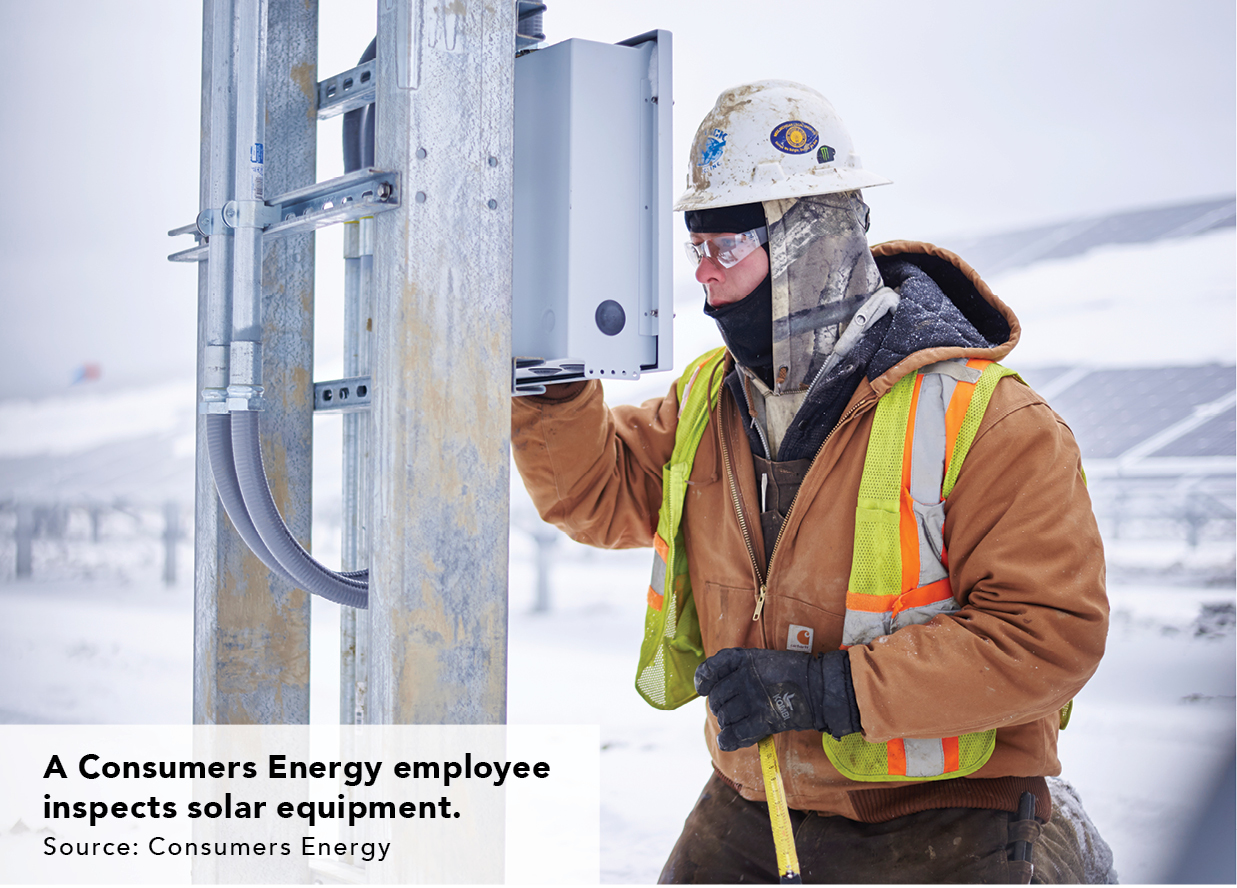Combatting climate change is a herculean task, and Team Michigan is proving it is up for the challenge. As a state that prioritizes the safety and well-being of its citizens, Michigan has worked with government and industry partners to make a positive impact on the environment and economy. A primary strategy the state has put in place is the MI Healthy Climate Plan, an initiative that serves as the state’s roadmap to reach carbon neutrality by 2050. With the plan in place, Michigan strives to see a 28% reduction by 2025 and 52% by 2030.
When the MI Healthy Climate Plan was released in April 2022, Liesl Clark, former director of the Michigan Department of Environment, Great Lakes and Energy, said, “This is a uniquely Michigan plan. It was shaped by a multitude of Michiganders with varied perspectives on climate change.”
The MI Healthy Climate Plan outlines six main priorities: Commit to environmental justice and pursue a just transition; clean the electric grid; electrify vehicles and increase public transit; repair and decarbonize homes and businesses; drive clean innovation in industry; and protect Michigan’s land and water.
“One of Michigan’s greatest assets is its location advantage, including our access to water resources of the Great Lakes,” said Quentin L. Messer, Jr., CEO at the Michigan Economic Development Corporation (MEDC). “The MI Healthy Climate Plan helps us maximize our advantage by ensuring we are intentional about preserving our resources for future generations. At MEDC, we are focused on attracting and growing businesses that not only create jobs, but also demonstrate a commitment to sustainable practices that will ensure long-term economic opportunity and well-being for all Michiganders.
“In 2021, Michigan was recognized as a top state in sustainable development practices by Site Selection Magazine, affirming Michigan’s commitment to green energy practices and demonstrating our competitive advantages when it comes to addressing climate issues. Michigan will be a climate winner and this plan is an important part of the winning playbook.”
The MI Healthy Climate Plan has already begun to propel Michigan’s economic development, create thousands of clean energy jobs and lower energy and transportation costs for working families and businesses, while helping the state work towards energy independence, mitigate the worst impacts of climate change, improve public health and protect natural resources and wildlife. At the helm of these efforts, Governor Whitmer has swung into action by attracting massive investments in battery and electric vehicle (EV) manufacturing, introducing 21,600 new jobs and cementing Michigan as a top state for business in this rapidly expanding industry.
Cleaner, Greener Energy
Michigan utility providers DTE and Consumers Energy are essential to the state’s eco-friendly efforts.
In 45 Michigan counties, more than 4 million people rely on Consumers Energy for their natural gas services. To meet the needs of Michiganders while protecting the planet, Consumers Energy has introduced its Clean Energy Plan, an outline of efficient ways to improve the company’s environmental impact. The 20-year strategy’s first goal is to be one of the first energy companies in the country to go coal-free. Consumers plans to achieve this by 2025 when their final coal plant is set to retire. The impact of this goal alone would cut greenhouse gas emissions by 60%, improve air quality and reduce the company’s water usage by more than 220 billion gallons per year.

Consumers’ Clean Energy Plan also aims to replace its energy sources with renewable alternatives. Over the next two decades, the company strives to source 90% of its energy directly from resources such as solar, wind and hydropower.
To make this goal a reality, the company announced plans to purchase four Michigan-based natural gas generation plants to replace their coal plants in Essexville and West Olive. These additional plants, along with the company’s existing natural gas plants in Zeeland and Jackson, will aid in Consumers’ efforts to add 8,000 megawatts of solar power and 550 megawatts of energy storage by 2040.
Consumers is devoted to developing affordable and efficient energy alternatives for Michigan’s businesses and communities. By integrating emerging technologies and establishing reliable energy sources, Consumers is notably fueling the future of the Great Lakes State.
As a response to the climate crisis, DTE Energy has created its CleanVision plan. The 20-year plan will transform the company’s clean energy production while staying reliable and affordable. Surpassing its previously announced goal to decrease its output of carbon emissions, DTE estimates a 65% reduction in emissions by 2028, followed by 85% in 2035, 90% in 2040 and reaching net zero by 2050. DTE’s strategies include developing over 15,000 MW of wind and solar energy. The company also plans to build over 1,800 MW of energy storage, more than double its current capacity.
“One of Michigan’s greatest assets is its location advantage, including our access to water resources of the Great Lakes. The MI Healthy Climate Plan helps us maximize that location advantage by ensuring that we are intentional about preserving that advantage for future generations.”
— Quentin L. Messer, Jr., CEO, Michigan Economic Development Corporation
Alongside the CleanVision Plan, DTE supports the creation of Michigan-made renewable energy through the MIGreenPower program. Known as one of the country’s largest voluntary renewable energy programs, MIGreenPower has made a major impact on Michigan by increasing the number of solar energy projects in the state. The affordable program allows customers to attribute a percentage of their monthly electric usage to local clean energy projects. As of March 2022, the program surpassed 50,000 residential subscribers, with approximately 500 new residential customers joining each week. As the program continues to grow, DTE is focused on investing in Michigan by introducing new solar projects in the state. With over 100 projects in various stages of planning and development, DTE is determined to bring Michigan into a cleaner, greener future.
Another way Michigan is lowering its carbon footprint is through expanding its industrial transportation infrastructure. In support of Ford’s new $3.5 billion EV battery factory in Marshall, economic development officials have asked the government for $750 million in site-readiness funding. As a partnership between Marshall Area Economic Development Authority and Norfolk Southern Corp., the proposal includes $15 million for rail improvements.
Though railways are already the greenest way to ship freight over land, Norfolk Southern Railway, a prominent U.S. transportation company with nearly 500 miles of track in Michigan, is working to lower its carbon footprint. In 2021 the company issued $500 million in green bonds to reduce its carbon emissions. This funding helped launch the Norfolk Southern Carbon Calculator, which allows customers to make informed transportation decisions and reduce carbon emissions from their own supply chains by estimating avoided emissions for shipping freight by rail versus truck.
What Hydrogen Offers
In September, the University of Michigan (U-M) and the MEDC released the Hydrogen Roadmap for the State of Michigan report. Backed by funding from MEDC, the report was prepared by the U-M’s Center for Sustainable Systems and is stated to be a high-level assessment intended to help guide planning and future detailed analysis of a Michigan “hydrogen ecosystem” that encompasses production, delivery, storage and end-use applications. The report responds to the U.S. Department of Energy’s $7 billion funding opportunity to create six to 10 regional “H2 Hubs” that will establish a clean-hydrogen network in the United States.

DTE Energy already provides 15% of energy from renewable resources.
Source: DTE Energy
As a leading member of the Midwestern Hydrogen Coalition, a team of seven Midwestern states focused on clean energy innovation, Michigan is working to accelerate the regional development, production, processing and use of clean hydrogen. Through hydrogen innovation, Michigan hopes to enhance energy security, reduce pollution and lower energy costs for consumers and businesses.
“Michigan has a tremendous opportunity to capitalize on its rich manufacturing heritage and mobility strengths by tapping into hydrogen as a clean fuel source,” said Nadia Abunasser, Federal Opportunities Director at MEDC. “As we work toward a clean-energy future, this report will play a critical role in strengthening our leadership as a state for businesses of all sizes to find opportunities for investment and growth.”
Transitioning from diesel to hydrogen fuel in medium-to heavy-duty vehicles is among the many monumental changes Michigan is making to improve not just the environment, but the public’s overall health.
Michigan has emerged as a forward-thinking advocate for combatting climate change. The companies operating in or looking to invest in Michigan are noticing these efforts, and the business case is clear: If your organization wants to be a sustainable, future-forward leader, Michigan and its commitment to a cleaner, healthier future is the place to be.

